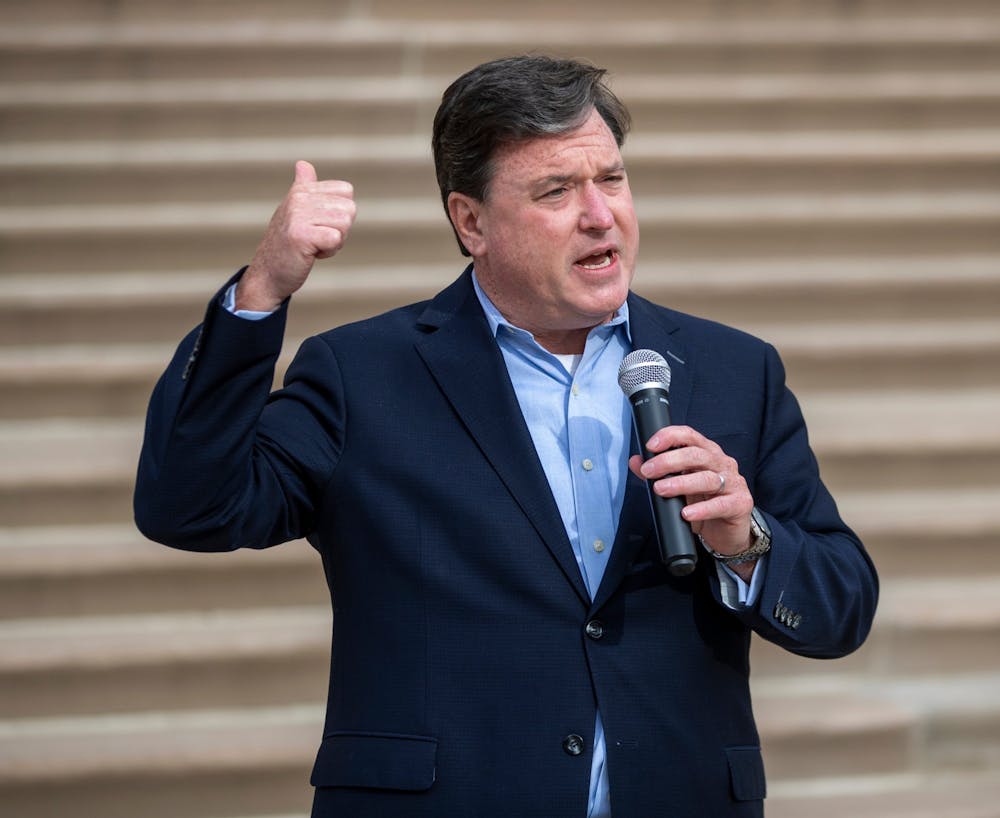Indiana Attorney General Todd Rokita expressed his support for the Metropolitan School District of Martinsville and their decision to appeal a U.S. Court of Appeals for the Seventh Circuit decision – which would allow a male transgender student to access the boys' bathroom at school – in a press release Aug. 24
“Nothing in the U.S. Constitution, Title IX or any other federal law requires schools to have coed bathrooms, locker rooms and showers,” Rokita said in the press release.
He also said that these coed facilities pose a direct threat to children’s health, privacy, safety and security.
Rokita also encouraged leaders in the Vigo County School Corporation, whose case was consolidated on appeal with the case against the Metropolitain School District of Martinsville, to follow the district and appeal the decision.
In the case against the Vigo County School Corporation, plaintiffs B.E and S.E. are 15-year-old twin high school students who, along with being diagnosed with gender dysphoria, have a condition that impacts the functioning of their colons. This condition requires them to take laxatives which makes bathroom access a particularly sensitive issue, according to the court document.
A.C, the 13-year-old middle school student in the Metropolitain School District of Martinsville case, and B.E and S.E, sued their respective school districts and principals. A.C. sued in December of 2021 and B.E. and S.E. sued in November of 2021. According to the court’s decision, the students alleged the school districts violated Title IX and the equal protection clause of the 14th Amendment.
In the case Whitaker v Kenosha Unified School District No. 1 Board of Education, which the district courts based their decision on, the Seventh Circuit was guided by the decision in the case, Price Waterhouse v. Hopkins according to the court document. Price held that discrimination based on sex-stereotyping violates Title VII of the Civil Rights Act of 1946. The court, according to the document, reasoned that a policy requiring an individual to use a bathroom that does not conform with their gender-identity punishes them for gender-nonconformance, thus violating Title IX.
Regarding the 14th Amendment violation in the Whitaker case, the court used intermediate scrutiny on the school district’s bathroom policy because it was based on sex classification. Because of this, the court required the school to provide exceedingly persuasive justification for their policy.
The school justified their policy by saying they needed to protect student privacy rights according to the court document. The court found this reasoning unconvincing because, according to the document, there was no evidence that the student, A.W, was less discreet while using the bathroom than other students or that the bathroom stall doors didn’t provide adequate privacy.
The students also requested preliminary injunctions that would order the schools to give them access to the boys' restrooms and for the Vigo County students, access to the boys’ locker rooms when changing for gym class.
The Metropolitain School District of Martinsville, according to the decision, has an unofficial policy for handling gender-affirming bathroom access for high schoolers. The district evaluates each request for bathroom-access based on a list of factors including how long a student has identified as transgender, if the student is under a physician’s care, if the student has been diagnosed with gender dysphoria.
A.C tried to show the district that he qualified for accommodation based on these factors, but the district said the policy couldn’t be implemented in the district’s middle schools.
Vigo County has an official policy regarding transgender students’ access to bathrooms. The official policy accommodates transgender students based on a variety of factors including age, gender marker on the birth certificate, the duration of social transition and if the students name and pronoun change request is on file with the school corporation.
Terre Haute North Vigo High School, where the students attend, also insisted that surgical change was required before a transgender student could use gender affirming bathrooms. This requirement, according to the court, leaves most of their policy null as Indiana bans such surgeries for patients under the age of 18 and as some transgender people choose not to have surgery due to the risks and costs.
Gender affirming surgery, according to the Human Rights Campaign, includes a variety of procedures such as plastic surgery to make the face more typically masculine or feminine, “top surgery” to make changes to the chest or torso or “bottom surgery” to make changes to the genitals.
According to the Human Rights Campaign, transgender and non-binary people typically do not have gender-affirming surgeries before the age of 18. In rare cases, 16- or 17-year-olds have received gender affirming surgeries. The surgeries were done to reduce the impacts of significant gender dysphoria and are limited to clinically necessary cases after talking with parents and doctors.
Troy Castor, a representative from Riley Hospital for Children and senior vice president of governmental affairs at IU Health, said the hospital does not perform gender transition surgeries on anyone under 18-years-old in a committee hearing for Senate Enrolled Act 480.
In both cases, the district courts granted the preliminary injunctions based on the Seventh Circuit’s ruling in Whitaker v Kenosha Unified School District No. 1 Board of Education. In this case, the court affirmed the district court’s order stating that litigation concerning transgender rights is happening across the country and they assume the Supreme Court will step in at some point with more guidance.
“Until then, we will stay the course and follow Whitaker,” Circuit Judge Diane Wood wrote in the decision. “That is just what the district courts did, in crafting narrowly tailored and fact- bound injunctions.”
Rokita also mentioned the Supreme Court in his press release, stating that the Supreme Court should resolve the dispute over coed bathrooms once and for all.
Both Rokita and the Seventh Circuit also acknowledged the varying U.S. Court of Appeals circuit courts opinions.
The Seventh Circuit said there is a split between decisions from different circuit courts. The Fourth Circuit decided that denying access to gender-affirming bathrooms can violate Title IX and the equal protection clause while the Eleventh Circuit did not find any violations.
“Fortunately, at least one other U.S. Court of Appeals has reached a different conclusion and affirmed schools’ right to maintain separate boys’ and girls’ bathrooms, regardless of gender identity,” Rokita said in the release.
The Board of Education of the Metropolitain School District of Martinsville authorized Bose McKinney & Evans LLP, a law firm, and any recommended firm to take action to appeal the Seventh Circuit’s decision. The authorization would allow the firms to act to preserve the school board's autonomy to make decisions and reverse the Seventh Circuit’s decision in a resolution on Aug. 17.
Rokita said that as legal actions proceed, he and his office will continue to work on the sides of Indiana families and school officials by advocating for single-sex bathrooms to protect children.






